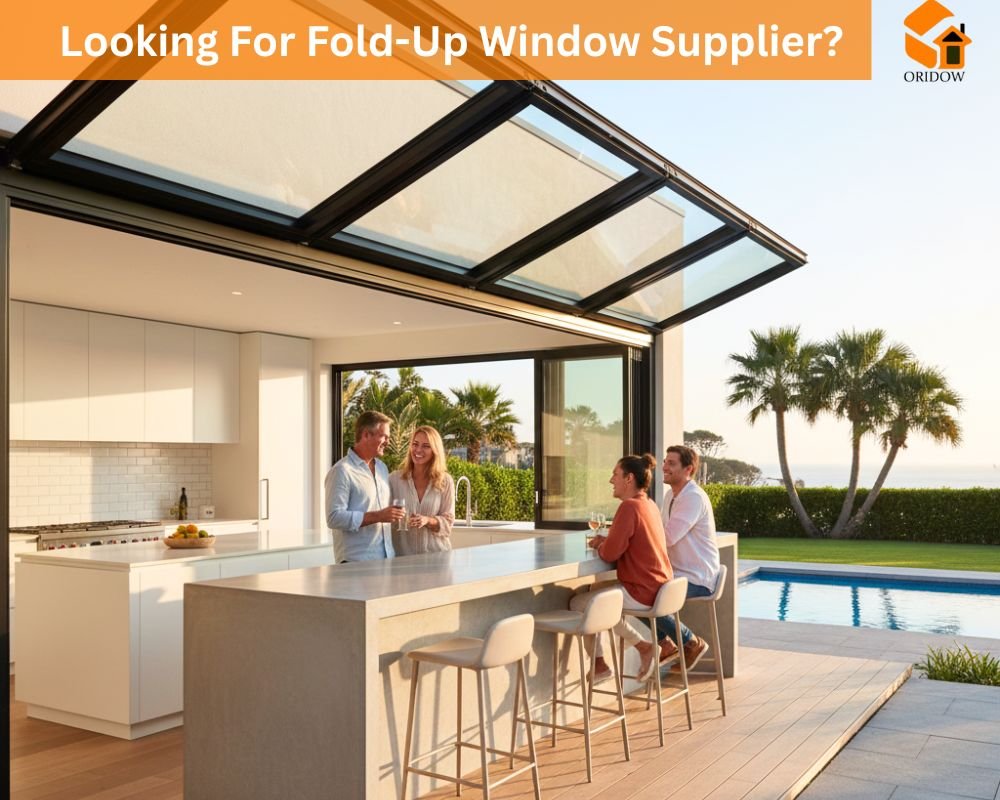Choosing a fold-up window supplier is one of those decisions that can shape how your space functions for years. These aren’t typical sliding or fixed windows fold-up systems have lifting hardware, weight-rated profiles, and counterbalance mechanisms that must work smoothly every time. When built well, they transform indoor-outdoor spaces with ease. When built poorly, they sag, leak, or fail to open consistently.
A great supplier combines durable materials, performance-tested hardware, insulation, and reliable support both during installation and after the project is complete. Before choosing one, it helps to understand what actually affects quality: materials, engineering, hardware lifespan, glazing, and long-term serviceability.
Fold-up windows are becoming popular in kitchens, patios, restaurants, bars, and commercial venues. With growing demand, more suppliers have entered the market some highly specialized, others simply adapting generic systems. Knowing how to compare them helps you make a confident, informed decision.
What Should You Look For in a Fold-Up Window Supplier?
Fold-up windows operate under mechanical load, so the supplier’s engineering standards matter as much as the visible design. You’re not just buying a window you’re investing in a system that opens, lifts, seals, and locks repeatedly over the years.
Key Qualities of a Reliable Supplier
- Structurally reinforced aluminum profiles.
- Insulated or UV-protected glazing.
- Weight-balanced lifting mechanisms
- Smooth, corrosion-resistant hardware
- Multi-point sealing + weather-proofing
- Custom sizing instead of predefined sets.
- Documentation + installation guidance.
- Real warranty coverage, not vague promises.
If you’re comparing system designs, reviewing different window styles can help determine which configuration matches your opening size.
How Do You Verify Material Quality and Engineering?
Material choices tell you more about long-term durability than surface aesthetics.
Choose Structural-Grade Aluminum
Aluminum is popular for fold-up systems because it’s strong without being heavy. Look for:
- 1.2mm–3.0mm profile wall thickness
- Powder-coated or anodized surfaces
- Marine-grade corrosion resistance
- Thermal-break profile options
Avoid systems using overly thin metal or soft alloys that bend under repetitive use.
Look at Hardware Quality
Instead of standard hinges, fold-up systems use lifting devices, cable systems, reinforced pivot points, and locking tracks.
Prefer hardware made from:
- Stainless steel 304/316
- Powder-coated alloy components
- Tested mechanisms with cycle ratings
Hardware failure is one of the most common issues in low-cost systems.
Evaluate Glass Performance
Good glazing improves safety, comfort, and energy efficiency.
Look for:
- Tempered or laminated safety glass
- Insulated IGUs for climate control
- Low-E coatings to block infrared heat
- Seal-tested edge spacers
How Much Do Fold-Up Windows Cost?
Pricing varies depending on opening size, lift mechanism, glazing upgrades, finishes, and installation complexity.
Main Cost Variables
- Manual vs. motorized lifting
- Height + width of opening
- Number of panels and weight
- Insulation + thermal performance rating
- Hardware load requirements
To better plan your budget, reviewing a detailed cost breakdown can help clarify what drives pricing.
What Makes a Quote Trustworthy?
A professional quote typically includes:
- Profile series + alloy type
- Hardware brand + movement system
- Glass thickness + insulation rating
- Finish + color treatment
- Warranty term
- Lead time and delivery notes
A vague quote is often a red flag.
What Red Flags Should You Avoid?
Some vendors offer fold-up systems but lack real engineering background.
Major Red Flags
- No test data or performance certificates
- Unspecified hardware or generic hinges
- No documentation for opening requirements
- Lead times constantly changing with no tracking
- Very cheap pricing without specs
- Warranty limited to “manufacturing defects”
Subtle Issues to Watch
- Limited glass options
- Only predefined sizes
- No support for installation
Why Oridow Is a Strong Choice for Fold-Up Window Systems?
Once you’ve narrowed down technical requirements, the next step is choosing a manufacturer that can support performance and longevity. Oridow stands out because they specialize in engineered aluminum systems built for smooth operation, frequent use, and large structural openings.
Multiple Profile Series for Different Structural Needs
Instead of a single frame type, Oridow offers several series designed around span width, weight, and opening height.
| Series Type | Wall Thickness | Profile Width | Recommended Opening Size |
| 55 Series | 1.1–2.0mm | 55mm | Width ≤ 3000mm / Height ≤ 2000mm |
| 60 Series | 1.2–3.0mm | 60mm | Width ≤ 3300mm / Height ≤ 2000mm |
| 60-2 Heavy Series | 2.0–3.0mm | 60mm | Width ≤ 3500mm / Height ≤ 3000mm |
| 100 Series Manual/Electric | 2.0–3.0mm | 100mm | Width ≤ 3500mm / Height ≤ 3000mm |
| 138 Series Electric | 2.0–3.0mm | 138mm | Width ≤ 3500mm / Height ≤ 3000mm |
This range allows buyers to match a system to their design needs rather than resizing the opening to fit a product.
Patented Lift Mechanism for Smooth Operation
Oridow uses a high-precision aluminum lifter system that adjusts force to the height and weight of each window. Benefits include:
- Smooth lift motion even with large sashes
- Lower motor load for electric units
- Reduced hardware strain
- Stable alignment over years of operation
This is ideal for restaurants, hospitality spaces, and open-air designs.
High-Strength Aluminum Built for Longevity
Their profiles feature corrosion-resistant alloys with up to 3.0mm wall thickness, which helps resist warping and deformation.
Key advantages:
- Better structural support
- Longer seal and hinge lifespan
- Improved performance in coastal environments
- Consistent operation under heavy use
Insulated Low-E Glass Options
Their glass options include dual-pane tempered units with Low-E coatings for energy efficiency and UV reduction.
Performance benefits:
- Lower HVAC load
- Reduced glare and heat
- Improved acoustic insulation
- Fog-resistant seal structure
Long-Term Warranty Coverage
Oridow provides progressive warranty support based on component type:
- 20 years on frames
- 10 years on hinges + lifting hardware
- 2 years on glass seal performance
- Fully transferable coverage
This warranty reflects confidence in both manufacturing and mechanical durability.
Compare Installation Support
Even the best system fails if installed incorrectly.
What to Confirm
- Structural opening dimensions
- Wall depth and mounting requirements
- Flashing + waterproofing instructions
- Manuals for motorized systems
- Retrofitting compatibility
If you’re working with architects or contractors, you can request guidance through their support team.
How Do You Compare Installation Support?
Even the best window system can fail due to poor installation, so you should confirm what support a supplier provides.
Details to Request
- Structural opening requirements
- Motor wiring diagrams
- Flashing + sealing instructions
- CAD drawings for architects
- Retrofit guidelines for remodels
If you need help coordinating installation, reaching out for project guidance through their team is useful you can get support before finalizing measurements.
Final Takeaway
Fold-up windows are not just architectural features they are engineered systems. Choosing the right supplier means focusing on hardware quality, structural profiles, insulation, and long-term support rather than just visual design.
Once you’ve narrowed down sizing and application, comparing different window styles can help finalize which system fits your project best. And if you want the windows to last, keeping up with proper maintenance is key following a professional care guide helps preserve long-term performance.
Frequently Asked Questions
Are fold-up windows weatherproof?
Yes, when built with insulated glass, compression seals, and corrosion-resistant hardware. Weather performance depends heavily on correct installation.
Do fold-up windows require maintenance?
Yes they have moving parts and seals that benefit from periodic lubrication and inspection. A structured care guide is helpful for upkeep.
Are they suitable for restaurants and commercial spaces?
Absolutely. These systems are frequently used in bars, patios, and storefronts to open spaces to the outdoors and expand seating.
Should I choose custom sizing?
Yes custom sizing ensures proper lifting mechanics, proper sealing, and safer load distribution.






